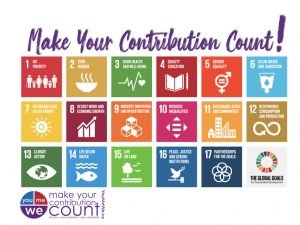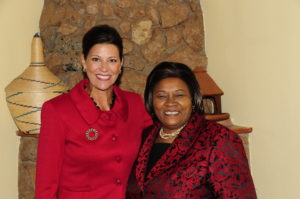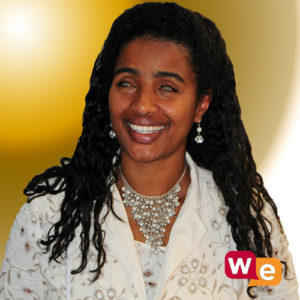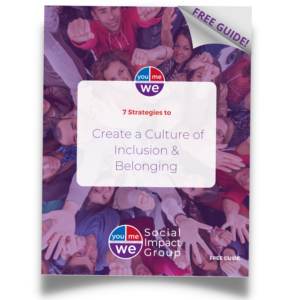What does the world need, and how can your small business contribute to it?
As a small business, it can be a challenge to incorporate a social initiative into your business that the team can get behind and promote. In the last YouMeWe Infusion, I shared strategies to connect your colleagues to what they care about (link). Their compassion-connection™, what your company can provide, and what the World needs must be complementary, not contradictory.
by Suzanne F. Stevens, Conscious Leadership and Social Contribution Cultivation,
Founder, YouMeWe Social Impact Group Inc. Part of the Nobody Wants to Work Series.
Meaning value-aligned initiatives are at the root of who you contribute to.
There is no limit to the number of social, economic, or environmental issues that need our attention. During the pandemic alone, we have:
- Witnessed more people of all abilities, cultures, races, genders, sexual orientations, and sizes feel more isolated.
- Seen our systems break down and people along with them.
- Noticed a dramatic increase in the demand for foodbanks.
- Observed an exodus of mothers leaving the job market to homeschool.
- Supported small businesses struggling to survive.
- Heard of more minorities being attacked, disregarded, and degraded.
- Experienced the environment yelling back at us for our continuous disregard.
- Evaded our responsibility to assist provide vaccines to developing countries
This list doesn’t include the United Nations 2030 Sustainable Development Goals, consisting of 17 Goals and 169 associated targets. This is the world’s to-do list, and we all can chip away at it. Check out this fantastic resource https://www.un.org/sustainabledevelopment/sustainable-development-goals/. It lists the goals, facts and figures, targets, and links to learn more that will stimulate all sorts of ways to contribute.
Goals and 169 associated targets. This is the world’s to-do list, and we all can chip away at it. Check out this fantastic resource https://www.un.org/sustainabledevelopment/sustainable-development-goals/. It lists the goals, facts and figures, targets, and links to learn more that will stimulate all sorts of ways to contribute.
UNICEF or Red Cross also share what they are focused on and why. Another resource to stimulate what your team can contribute to. And for more one-off initiatives, the UN International Days Calendar will likely stimulate thinking.
So, finding what the world needs isn’t the issue. Consciously contributing can be more challenging.
Finding what the world needs
In the West, we have a saying that it’s better to give than to receive. The premise of this saying is that we feel better when we give. The real flaw in this adage is giving just because it feels good only satisfies our ego or reduces our feeling of guilt. We need to contribute consciously. We need to ask ourselves, “Will my contribution cultivate the intended behavior? Is the receiver better off because of my giving?”
Giving is handing something over that you may not want; contributing emphasizes helping to achieve the desired outcome. Contributing also implies a lifelong pursuit rather than a transaction. YouMeWe embraces “contributions” for that reason.

As Katherine Ichoya’s, a change-maker interview on YouMeWe Amplified says, “Don’t start things for your own fulfillment. Start them to make a difference to uplift the life of someone else.”
To provide what the world needs, consider these three foundations of contributing and how to make it count:
-
Ensure your contribution creates dignity and/or opportunity
An interview that convinced me of the harm giving can cause was with Yetnebersh Nigussie, a young woman who helped change the perception of disability in Ethiopia.

Blind since age five, she sees unsolicited giving to be laced with assumptions. She describes receiving charity as “based on the goodwill of the giver. The receiver has no say. There is an issue of pride and sustainability.” Yetnebersh is an advocate for giving opportunities and recognizes that everyone has value to contribute, regardless of their ability. (Check out her inspiring interview here: https://podcast.youmewe.ca/yetnebersh-nigussi/
Over the years, Yetnerbersh’s perspective has held in much of my research on how to contribute. Most recently, during the Diversity, Equity and Inclusion five-panel series I hosted. As a matter of fact, you can receive an overview of some key takeaways here (landing page), or watch the panel discussions (visit here: https://youmewe.ca/diversity-equity-inclusion-series/).
-
Consider the impact on the whole.
This may be counterintuitive. Many of us hope we can “help just one person.” However, through the school of hard knocks, I was ‘educated’ that helping one poor child by buying their picture may have vast implications on their entire community. For example, if a child makes money, they will continue to do what makes them an income AND forgo going to school. The change? No education, no way out of poverty.
Organizing your team to collect clothes for a specific initiative is often a great need to fill. Without due diligence, the challenge is that asking what is done with the clothes if not purchased may expose an unfortunate reality. Many of our clothing donations “leftover” are shipped to developing companies and either fill their landfills or are sold to street merchants at a low cost, cannibalizing the local clothing industry. To learn more about this, visit a previous YouMeWe Infusion blog on clothing donations: https://youmewe.ca/donate-your-gently-used-clothes/
-
Most importantly, ASK the beneficiary, “what do you want?”
Assumptions torment many givers’ decisions. Media, inflamed stories, a celebrity’s cause, and social media have shaped our views. Following doesn’t replace due diligence. Assumptions are often made and can cause bogging down systems. Consider have you ever:
- Gave food to a homeless person without considering their dietary restrictions?
- Sent cloths to support the Red Cross or the Canadian Council of Refugees (we have a send clothing reflex when people are in distress.) Sorting clothes often bogs down a limited resource system.
- Provided a holiday dinner and delivered it to a stranger? Making you the hero rather than a parent whose dignity is already lacking.
- Or assume that someone would want what we would want in their situation.
Our good nature often comes at a price. Our tendency to respond to a need, often under the banner of giving, has a short-term reward but can be riddled with obstacles to achieving long-term sustainability.
Assessing whether an initiative is helping or hurting can be complex. I don’t want to discourage contributing. But if I could curb one leader’s giving reflex. And promote a thorough consideration before you attempt to be the white knight in hopes of saving the day, then your consciousness has been increased, and you are likely to have a more profound impact.
So as you address what the world needs, remember that positive social impact results from a conscious and deliberate set of activities addressing a pressing social challenge that is often found in underserved populations that lack essential resources or services.
With the right intention and due diligence, you and your team can address a social gap while experiencing more sense of meaning by collectively serving something bigger than oneself.
What can you do now to make your contribution count?
Ask yourself what your community needs and what your business does to help fulfill it while staying aligned with your values and abilities?
Another approach is to start getting involved in community initiatives as a team and assess what resonates with individuals and the team as a whole. You may stumble on a cause that you all can get behind.
What does the world need, and how can your small business contribute to it?
 Download 7 strategies to create a culture of Inclusion and Belonging. inspired by advocates, business, and community leaders on how to engage diverse talent.
Download 7 strategies to create a culture of Inclusion and Belonging. inspired by advocates, business, and community leaders on how to engage diverse talent.
At YouMeWe Social Impact Group, we grow conscious leaders and their social impact—sustainably. Subscribe to YouMeWe Infusion to make your contribution count for you, your organization, and your community.
PS do you have a question about growing your social impact.
Let me know in the comment
The article was originally posted by %author_name% Originally posted on%post_title%
. This article originally posted on Source